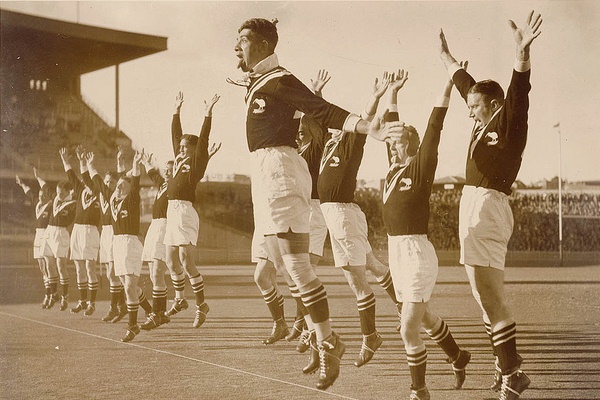The controversy erupting over Adam Goodes’ game time war dance is the kind of event which can only help outsiders distinguish Australia from New Zealand. While the haka, a traditional Maori challenge, is a routine part of New Zealand sporting life, it seems Australia is still suspicious of any integration between its national pastimes and its Indigenous cultures. The nasty reaction to Goodes’ spontaneous war dance proves that, although Indigenous players themselves can be popular, their culture isn’t.
It’s a situation that, for New Zealanders, is scarcely imaginable in reverse: instead of earning the roaring respect of the crowd, Goodes’ Indigenous war dance was met with boos and hisses. Eddie McGuire found it ‘violent’ and ‘aggressive’, while internet trolls vandalised Goodes’ Wikipedia page in retaliation. Respectable Australians may perhaps write this off as just another case of rowdy bogans behaving badly, a typical Eddie McGuire brain explosion, and another day in the life of an internet troll. Yet the unspoken explanation, and the only explanation that can account for history, is the relationship between sport and colonialism.
Australian sport is often talked about as the great equaliser: a sacred space where camaraderie can overcome intolerance and exclusion. Skin colour and surnames are irrelevant and athletic ability is the only measure of success – except when it isn’t. Eddie Gilbert, a Queensland cricketer who bowled Sir Donald Bradman for a duck in 1931, found himself excluded from higher honours because he happened to be Indigenous. In 2005, Parramatta Eels player Dean Widders was called a ‘black cunt’ by Rabbitohs captain Bryan Fletcher. And who can forget the moment Nicky Winmar lifted his jersey to honour his black heritage?
Quite the opposite to being the great equaliser, professional sport is actually the site of a great deal of public racism. But it’s also one of the most reliable pathways to success for Indigenous men. Football is, among other things, seen as a performance of a particular national identity and, for those Indigenous men who participate in this performance on-field, mainstream acceptance can follow. Yet Goodes has always subverted this performance. While he uses his athletic ability to perform the Australian identity on-field – blokey, fair dinkum and the rest – he uses his off-field profile to perform his Indigenous identity. For those who see the football codes and their players as quintessentially Australian, and think of ‘Australia’ as distinct from its Indigenous heritage, this must be terribly confronting.
This subversion of the expected ‘Australian’ performance offends the twin principles of settler colonialism: assimilation and integration. Both rely on Indigenous people performing the ‘Australian’ identity. When these principles are subverted, especially in a cultural institution like the AFL, sports fans struggle to find a modern response. Previous generations would simply exclude the Indigenous person, as they did to Gilbert, but modern fans don’t have that power. Thus they are left with the option of, quite literally, booing.
Perhaps this indicates progress of a kind, but a public retreat into crude personal racism is nothing to be proud of. Indigenous players may no longer be explicitly excluded from sport, but other harmful myths remain, like the idea that Indigenous people – and Pacific Islanders, for that matter – have a genetic propensity for aggression and are therefore naturally more suited to sport. It’s a new spin on the old idea of Indigenous peoples as ‘savages’. Just like the myth that sport is a meritocracy – as if selection were made on talent alone – is a twist on the capitalist idea that the system is impersonal.
The myth of the Australian dream is that those who play by the rules, who observe the norms of mainstream society, will be treated and respected as members of that society. But this rule is only ever half-enforced when it comes to Indigenous people. They were never meant to be part of the Australian story. What Nicky Winmar knew in 1993 and Adam Goodes knows today is that sporting success is perfectly compatible with inequality and discrimination. The right to participate does not inevitably change the power relationship between (Indigenous) players, (white) fans and Australian society.
Colin Tatz coined the phrase that Indigenous players are ‘Australians when they’re winning and Aborigines at other times.’ Goodes is saying that he is Indigenous when he’s winning and Indigenous no matter what.






